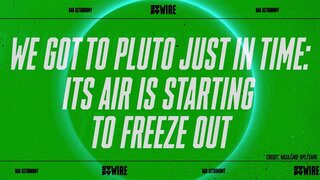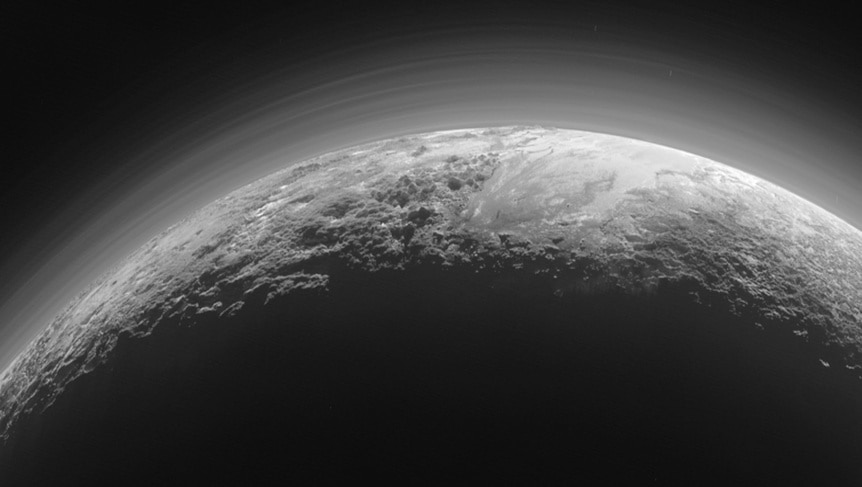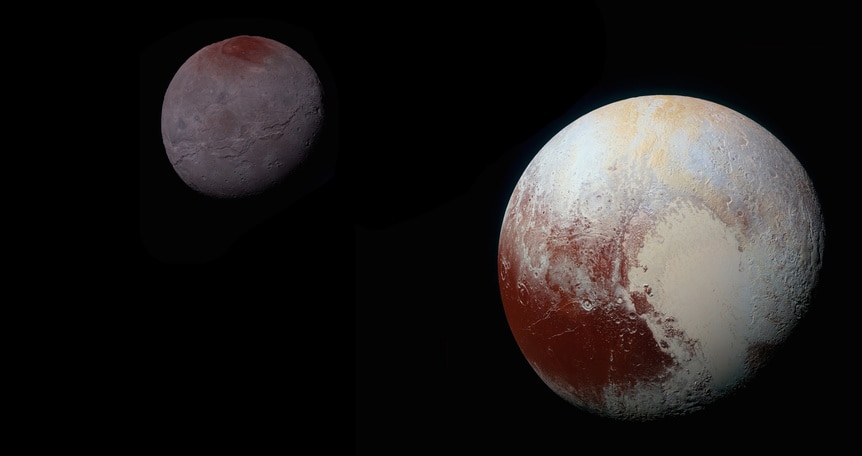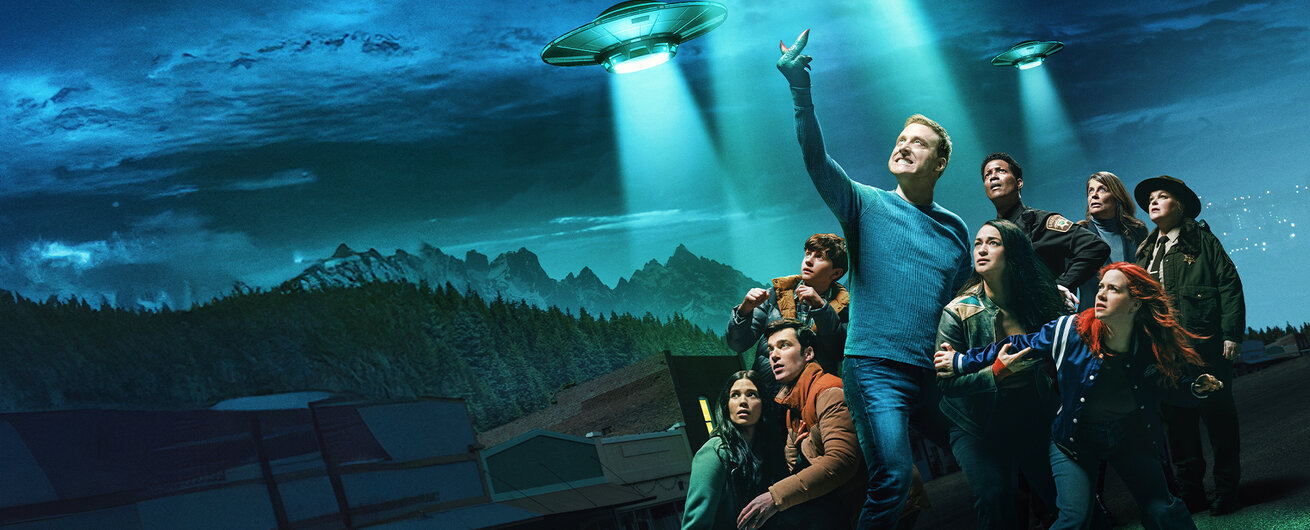Create a free profile to get unlimited access to exclusive videos, sweepstakes, and more!
Pluto Is a Planet Again, but Only in Arizona
And in our hearts.
The more we peer into the infinite expanse of the universe, the more exoplanets we find. Some of them are hot gas giants, larger than Jupiter but orbiting closer than Mercury. Some of them are small and rocky, similar to Earth. Some of them might even harbor intelligent extraterrestrials like Resident Alien’s Harry Vanderspeigle (Alan Tudyk), but all of them have a few things in common.
For a long time, there was no official definition of a planet. As long as something was pretty big, orbited a star, and looked sort of planety, we called it a planet. You could mostly just go with your gut, but the more planets we uncovered, both in our solar system and outside of it, the more we realized we needed some guidelines.
In 2006, the International Astronomical Union (IAU) settled on a definition and the newest planet on the block, Pluto, didn’t make the cut. Pluto’s status has been the source of debate in laboratories and bars ever since. Now, the state of Arizona has settled the debate once and for all, at least within the state’s borders, by naming Pluto its official state planet.
For More on Pluto:
Pluto May Have Once Had Huge Cryovolcanic Ice Flows
The Face of Pluto is Slowly Changing and Now We Know Why
Eerie Blue Haze on Pluto Isn't Paranormal, but it is Lethal Poison
How Pluto Became a Planet, Temporarily
In the late 19th century, Percival Lowell built himself an observatory in Flagstaff, Arizona and began an extensive hunt for a ninth planet in the solar system. He and his colleagues believed that the orbits of Uranus and Neptune were being disturbed by an as-yet-undiscovered world in the outer solar system. They called that world Planet X and they got to work trying to find it.
Sadly, Lowell died in 1916 with Planet X still undiscovered. He didn’t know it, but his surveys did pick up a couple of faint images of Pluto which wouldn’t be noticed until decades later. In 1929, the new director of the Lowell Observatory assigned a young astronomer named Clyde Tombaugh the task of picking up Lowell’s hunt.
Tombaugh spent about a year taking and comparing images of places in the outer solar system where he thought a world might be hiding. Using a device called a blink comparator, Tombaugh rapidly switched between two images of a spot taken on different nights. When comparing images, distant background stars will stay in the same position while nearer foreground objects like planets will move. Tombaugh confirmed the existence of Pluto on February 18, 1930.
Astronomers later agreed that Pluto was not the Planet X Lowell was looking for and, in fact, there may not be any Planet X at all. That didn’t stop Pluto from becoming everyone’s favorite weird little planet, and it is weird. Pluto orbits at about 17 degrees off the plane of the ecliptic. That means that while the rest of the planets are all spinning in more or less the same plane, Pluto dips above and below that plane as it circles the Sun.
Speaking of circles, Pluto has never heard of them. The orbits of planets are never totally circular but they like to be pretty close. Earth’s orbit gets as close as 91.4 million miles and as far as 94.5 million miles from the Sun, that’s a fairly small deviation from the average distance of 93 million miles, also known as one astronomical unit (AU). By contrast, Pluto gets as close as 2.75 billion miles (30 AU) and as far as 4.57 billion miles (50 AU) from the Sun. At certain points along its orbit, Pluto comes in closer to the Sun than Neptune. While most of the planets are flying in a nice formation, Pluto is dipping in and out just trying to keep up. But none of those qualities are why Pluto isn’t a planet anymore.
Why Pluto Was Reclassified as a Dwarf Planet
When the IAU set out to create a definition for planets, Pluto presented a problem. Anytime we create a definition or a category, all we’re really doing is drawing a circle around things with common characteristics. The question the IAU had to answer was what those characteristics should be, ultimately they settled on three. For an object to be a planet, the first requirement is it must orbit the Sun (or its parent star, in the case of exoplanets). That means that a world like Ganymede can’t be a planet, despite being bigger than Mercury, because it orbits Jupiter and not the Sun.
The second requirement is that it must be massive enough to have become spherical under the force of its own gravity. That tosses all but the largest asteroids. The final requirement is that an object must have cleared the neighborhood in its orbit. In other words, it needs to be the dominant gravitational player in its neck of the cosmic woods.
That third requirement was the point around which Pluto’s status (and that of some other solar system objects) hinged. If the IAU included the third requirement, then Pluto couldn’t be a planet. If they didn't include it, then we would have had to add a few extra planets to the list. Ceres, for example, is the largest asteroid in the asteroid belt and it meets the first two requirements.
Instead, a new category was created, and Pluto was reclassified from the smallest planet to the largest dwarf planet. Since the reclassification, a number of organizations and a significant portion of the populous has pushed back against what is seen as an emotionally laden astronomical demotion. It’s easy to see, given the history of Pluto’s discovery, why the state of Arizona might come down on the side of Pluto’s planethood.
Arizona Governor Katie Hobbs recently signed Arizona House Bill 2477 into law. It’s brief, void of the typical impenetrable legal jargon that usually populates amendments and revises a statute by adding a section. The new section, 860.08, contains just six words: Pluto is the official state planet.
For more space-based philosophical debates, catch Resident Alien, streaming now on Peacock.
























